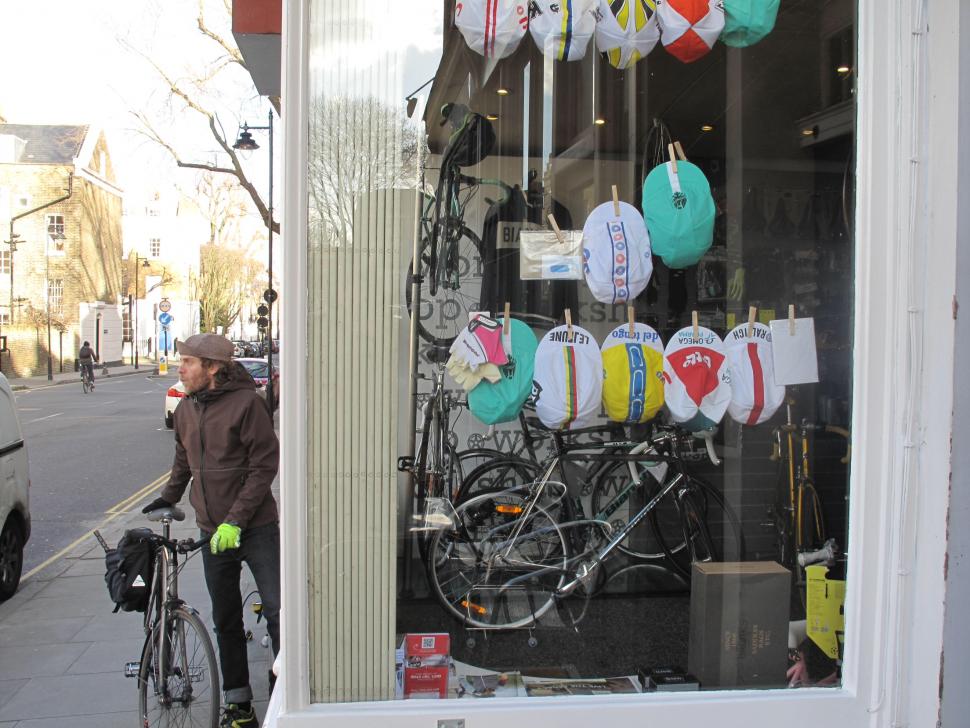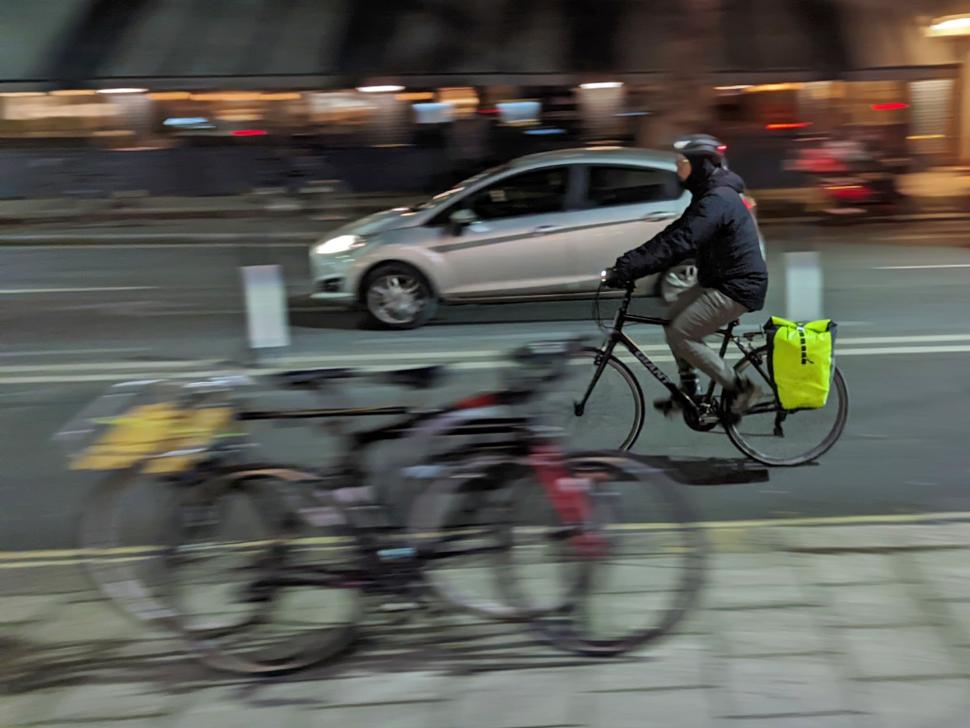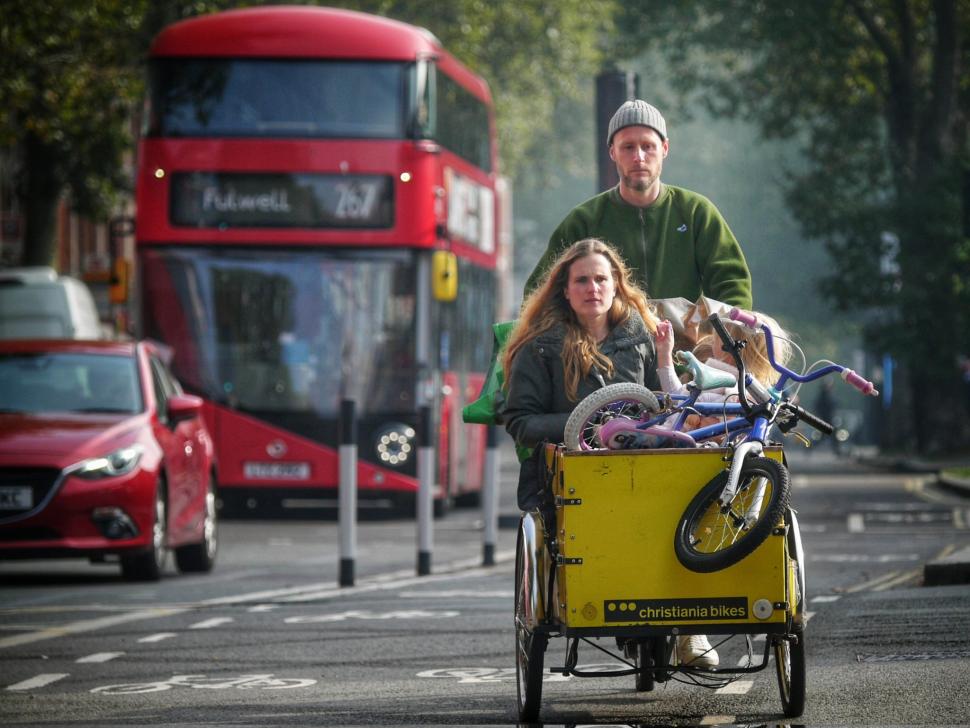- News
- Reviews
- Bikes
- Accessories
- Accessories - misc
- Computer mounts
- Bags
- Bar ends
- Bike bags & cases
- Bottle cages
- Bottles
- Cameras
- Car racks
- Child seats
- Computers
- Glasses
- GPS units
- Helmets
- Lights - front
- Lights - rear
- Lights - sets
- Locks
- Mirrors
- Mudguards
- Racks
- Pumps & CO2 inflators
- Puncture kits
- Reflectives
- Smart watches
- Stands and racks
- Trailers
- Clothing
- Components
- Bar tape & grips
- Bottom brackets
- Brake & gear cables
- Brake & STI levers
- Brake pads & spares
- Brakes
- Cassettes & freewheels
- Chains
- Chainsets & chainrings
- Derailleurs - front
- Derailleurs - rear
- Forks
- Gear levers & shifters
- Groupsets
- Handlebars & extensions
- Headsets
- Hubs
- Inner tubes
- Pedals
- Quick releases & skewers
- Saddles
- Seatposts
- Stems
- Wheels
- Tyres
- Health, fitness and nutrition
- Tools and workshop
- Miscellaneous
- Cross country mountain bikes
- Tubeless valves
- Buyers Guides
- Features
- Forum
- Recommends
- Podcast
news
 Local Bike Shop in London (copyright Simon MacMichael)
Local Bike Shop in London (copyright Simon MacMichael)UK bike sales fall to lowest level in 20 years
The extent of the challenge facing the bike industry has been highlighted in the Bicycle Association's Annual Market Data Report for 2022, with sales of bikes in the UK dropping to the lowest level in two decades.
Combining sales figures and other data the Association's research suggests that mechanical bike sales fell by 22 per cent in 2022, down to 1.8 million units and 27 per cent below pre-Covid levels.
The 61-page report, titled Riding out the Storm, notes that children's bike sales fell even further, to 700,000 units and 28 per cent below 2019 numbers.
On a more positive note, e-bike sales were reported to be more stable, even if overall volume has plateaued since 2020, while gravel bike sales are up eight per cent year-on-year and 59 per cent since 2019.
The report's author John Worthington, who is also the Bike Association's head of insights, said he expects the year ahead to be "turbulent" and "challenging".
> Halfords says cycling market is down 20 per cent year-on-year
"Once overall supply and demand return to a better equilibrium, and the economic environment improves, longer-term prospects for the cycling market are positive," he said. "But for the next 12 months the industry will need to weather a difficult storm."
It is not believed the problem is specifically one for the British-based bike industry either, with the report highlighting that sales in the United States are also lower than pre-pandemic levels.
However, the Bicycle Association also believes more can be done, with e-bikes sales still lagging far behind European levels. On the continent, sales of electric bikes have helped plug the gap left by falling mechanical bike sales, and growing the overall market.
"This report is not an easy read," Simon Irons, the market data service director at the Bicycle Association accepted. "However, as an industry we have to rise to the challenges ahead of us and do everything we can to make cycling a safe and attractive method of transport for more people in the UK. Most worrying is the decline in kids' bike sales. This is a key area of work for the BA and our industry in 2023."
> Shimano's cycling sales hit record high despite slowing demand
Highlighting action to halt the sales slide, the Bicycle Association asked the government to commit to multi-year funding for Active Travel England and continued investment elsewhere in the United Kingdom, as well as more support and focus on cycling's role in economic growth and net-zero strategies.
Along with local investment the Bicycle Association urged an increase in short journeys to be undertaken by bike wherever possible to reduce motor emissions.
Steve Garidis, the Bicycle Association's executive director, last summer said more needs to be done in the UK to boost cycling uptake, including providing further investment in infrastructure, secure bike parking facilities, and e-bike charging networks and subsidies.
> UK's cycling market and infrastructure "being left behind" by Europe, experts warn
In August, Garidis said "things are very difficult right now", an assesment which appears to have continued into 2023 based on the report for the full year previous.
"Since May 2021 sales have been tracking at below pre-Covid levels, and if you take out the 2020 mega boom in cycling and sales, we're now doing worse than we were before Covid hit," he said.
"When I look at the comparison between the UK and what's happening in Europe it's just a bit depressing, it's sort of stark.
"There's a definite sense that we’re being left behind, in terms of the size and value of the cycling market, but also left behind in terms of how people are getting around, both for leisure and for everyday [trips]."
Dan is the road.cc news editor and joined in 2020 having previously written about nearly every other sport under the sun for the Express, and the weird and wonderful world of non-league football for The Non-League Paper. Dan has been at road.cc for four years and mainly writes news and tech articles as well as the occasional feature. He has hopefully kept you entertained on the live blog too.
Never fast enough to take things on the bike too seriously, when he's not working you'll find him exploring the south of England by two wheels at a leisurely weekend pace, or enjoying his favourite Scottish roads when visiting family. Sometimes he'll even load up the bags and ride up the whole way, he's a bit strange like that.
Latest Comments
- chrisonabike 1 sec ago
Perhaps if they fully accepted "build cycle path" and had that at about the level of the footpath?...
- Jaijai 26 min 54 sec ago
This is another dumb leap .You want to go...
- Jaijai 1 hour 14 min ago
It may be aero but it's more ugly than anything
- IanEdward 3 hours 30 min ago
Damning the drivetrain with faint praise there! 😂...
- Rendel Harris 4 hours 11 min ago
He won the Giro after that. Strange definition of finished. His career as a winner was finished by the crash in the Dauphiné recon.
- cmedred 9 hours 15 min ago
Just a question: How did it rust without getting wet or damp? I thought moisture was needed for rust. If that's not the case, how do i protect my...
- wtjs 9 hours 21 min ago
I'm giving my usual thumbs-up to the Prestacycle. I carry it on all my trips
- HoarseMann 10 hours 6 min ago
Woman gets fine for illegally parking on Winnats Pass and will never return to park there after ordeal (umm, that's how parking fines are supposed...
- jarpots 10 hours 31 min ago
Nice product but has limitations, like most. Particularly if you use heavy electric bikes.


Add new comment
26 comments
E-cargo-bikes might be a brighter picture, although I've not checked the stats in the UK. All cycle users can ask for better infrastructure. I wonder whether 'business-users' of cargobikes in particular will be taken more seriously? The only way towns will meet carbon reduction targets is increasing cycling of all types, and that requires much better infrastructure. I'm currently in Trondheim, cycling on studded tyres on the snow and ice, where the local target is 8% of journeys by bike. They've put in 140km of cycle ways which they generally keep clear of snow.
I think 'bike' and 'e-bike' do the job.
Lots of unsold bikes out there both new and used. Most 2023 models are available in all sizes from the larger manufacturers, who are also busy discounting the remaining 2022 stock. eBay full of lockdown bikes at very optimistic prices - I'm looking for a very specific Defy Advanced and the same bikes are showing up week after week, all overpriced
yep; people still think they can get excessive covid era prices.
I dont think this is anything more than averaging out from the Covid spikes. Regardless of why for most poeple a bike is a once every few years purchase and Covid brought some sales forward. Sales will bounce back over the next couple of years.
Less money in peoples pockets, all time high hate against cyclists, an ever increasingly unfit and sedentary population. Its only going to go one way unfortunately.
Isn't this really just more bikes are marketed as 'gravel' rather than a real shift?
What kind of weird-ass bicycle is non-mechanical?
To differentiate from ebike
An e-bike, hence the old school description.
Very old school.
Mechanical bicycle
Motor bicycle - motorcycle
Electric bicycle
I'm off to coin a new word - mechcycle
According to something I heard a few months ago, the term "Acoustic" is now making its way from the world of musical instruments to other areas i.e. bicycles that aren't e-bikes are now (in some quarters, at least) being described as acoustic bikes! Utter madness!
Ebikes are often noisier.
That'll be why I feel the urge to scream 'Judas'! at every e-biker I see 😂
If there's a better niche reference on this forum this year it will have to be a very good one, chapeau!
I'm yet to hear a term to distinguish non-electric bikes that seems at all natural.
I have heard the "acoustic" one before and it just sounded completely weird, not to mention being linguistically non-sensical.
Mechanical bikes is ok, although not entirely clear cut given that e-bikes are still very much mechanical devices. Indeed, "mechanical" bikes are not "mechanically propelled vehicles" in UK law, where as an e-bike would be if not explicitly exempted under the EPAC regulations.
An "ordinary bike" already has a meaning and most ordinary bikes are not "ordinary bikes"! The term "safety bicycle" was used to distinguish from "ordinaries" but feels very dated now that "ordinaries" are pretty extraordinary.
"Traditional" or "classic" bike similarly conjure images of something old fashioned and would feel odd used to describe a modern road bike.
How about "E-powered" and "Me-powered"?
how 'bout just bike and e-bike..
Im a brit but I work for 99Bikes (Aussie company, in Brisbane) but we've just bought Hargroves Cycles.
Internally, non e-bikes are referred to as "analogue".....seriously.
Could sales be down because there haven't been the bikes there to actually buy?
My guess would be the sort of person who buys a bike in the middle of a COVID lockdown after realising, actually, cycling is fun (bumping up sales), is not the sort of person that buys another bike less than 3 years later.
I havent bought a new bike for nearly 10 years.
I did buy one during the pandemic, but that was nine years after I'd bought my previous bike and I'm not expecting to buy another one anytime soon.
Same here. And if my bike hadn't have been totalled I would still be using it.
Front line NHS, my bike is circa 2014. The cost of even a basic bike that isn't a BS0 is totally nuts, that, balanced against my wages and the bills going out that I need to pay, so as to live, I can't afford to buy a new bike!
It's time to wake up.
Brexshit has fucked cycling.
It's time to take back control!